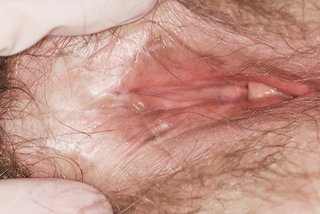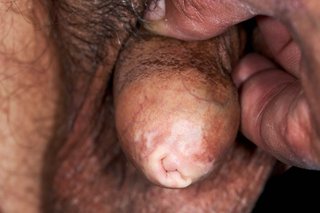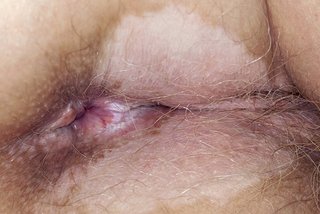Symptoms of lichen sclerosus
Lichen sclerosus affects people of all ages, including children. But it's much more common in women over 50.
People with white, brown or black skin can get lichen sclerosus.
It causes patches on the skin that are usually:
- itchy
- white
- smooth or crinkled
- easily damaged – they may bleed or hurt if rubbed or scratched
The patches can appear anywhere, but most often are on the:
- area around the opening to the vagina (vulva) and anus
- foreskin and end of the penis
Having sex can be painful because the vulva may shrink or tighten. In men, the foreskin may tighten making erections painful.
See what lichen sclerosus looks like on the vulva, foreskin and anus



Things you can do to help with lichen sclerosus
If you have lichen sclerosus, there are some things you can do to help stop your skin becoming irritated or damaged.
Do
-
wash with an emollient soap substitute instead of regular soap – ask a doctor or pharmacist about suitable products
-
gently dab your genitals dry after peeing
-
regularly apply a barrier cream or ointment, such as petroleum jelly, to affected areas
-
wear cotton or silk underwear
-
use lubricant if sex is uncomfortable
Don’t
-
do not smoke
-
do not scratch or rub the affected skin
-
do not use scented soaps, bubble bath or shower gel
-
do not wear tight or restrictive clothes, such as tight-fitting underwear
-
do not wash your underwear with detergent – just use water
-
do not wear panty liners or use fragrance-free ones if you need to use them
-
do not do activities like cycling or horse riding until your symptoms have improved
-
do not smoke or go near naked flames if you use an emollient – emollients are not flammable on the skin, but when they get on fabrics such as dressings, clothing and bedding they can catch fire more easily
Non-urgent advice: See a GP if you have:
- an itchy white patch on your genitals or skin
- been diagnosed with lichen sclerosus and treatment is not helping
- been diagnosed with lichen sclerosus and have pain when going to the toilet or having sex
A GP may refer you to a specialist for tests and treatment.
Treatment for lichen sclerosus
Lichen sclerosus cannot be cured, but using a strong prescription steroid ointment usually helps relieve the symptoms.
You may need to use the ointment regularly for a few months to get your symptoms under control. Your doctor will tell you how often you need to use the ointment.
After the initial treatment period, you may need to use other products, such as a weaker steroid ointment or a moisturising cream, to help manage your symptoms.
Follow your doctor's advice about how and when to use any medicine that's prescribed for you.
Problems caused by lichen sclerosus
Although treatment for lichen sclerosus can help, the affected skin can sometimes become scarred and tight over time.
The vulva may shrink, with the clitoris and small inner lips (labia minora) around the opening of the vagina often affected.
The scarring and tightness can cause discomfort when peeing, pooing and during sex. Having an erection can be painful.
If lichen sclerosus is severe, you might need a small operation, such as surgery to widen your vagina or remove your foreskin (circumcision).
Cancer and lichen sclerosus
Lichen sclerosus increases your risk of getting cancer on your vulva, penis or anus.
The risk is low, but it's a good idea to check yourself regularly and see a GP if you're worried.
Symptoms to look for include a lump, a change in skin texture, such as thickening, or an ulcer that does not go away.
Find out about vulval cancer, penile cancer and anal cancer.
Causes of lichen sclerosus
The cause of lichen sclerosus is unknown.
It might be caused by your immune system, the body's defence against infection, mistakenly attacking and damaging your skin.
Lichen sclerosus is:
- not caused by an infection
- not contagious – you cannot spread it to other people through close contact, including sex
- not caused by poor personal hygiene
Rubbing or damage to the skin can trigger lichen sclerosus or make it worse.
Page last reviewed: 09 December 2024
Next review due: 09 December 2027